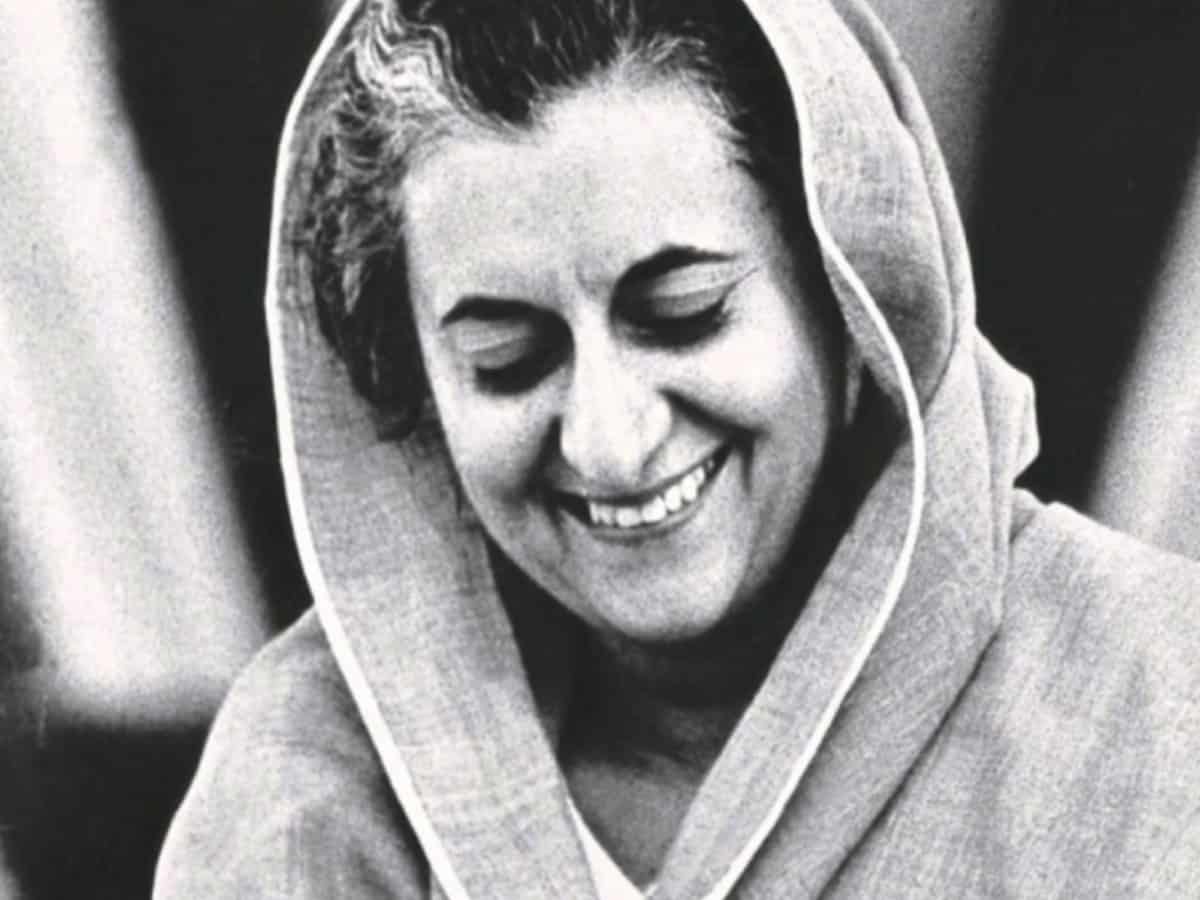
Indira Gandhi is the most maligned, misrepresented, and misunderstood leader in our times. It is time to revisit her work and contribution and reassess her legacy and how it helped shape the national personality of Modern India.
November 19 this year marks the 103rd Birth Anniversary of Indira Gandhi, the first and only woman Prime Minister of India. Her election to the top post took the world by storm. A fledgling democracy reposing faith in a woman Prime Minister to steer the nation at a critical juncture in her history came as a huge surprise for the entire world.
Indira Gandhi did not disappoint the people, either. She more than justified the confidence that the people had reposed in her. She laid down her life, to uphold national unity and integrity.
Britain’s former Deputy Prime Minister and British Labour Party leader Michael Foot once remarked that if India was held together as a nation during the tumultuous years from 1966 to 1977, credit goes solely to Indira Gandhi. Perhaps, that is the best tribute ever to the work and contribution of Indira Gandhi.
Her tenure in office was tumultuous. Language riots, anti-cow slaughter agitation in which her nose was broken, drought, war with Pakistan, and the influx of 10 million refugees from erstwhile East Pakistan, besides international crude oil crisis in 1973 were among the several challenges she met with resoluteness.
Overcoming the challenges, she ushered in Green Revolution that resulted in the national self-sufficiency in foodgrains. India under Indira Gandhi emerged with the third largest pool of trained scientific manpower; fifth largest Army; sixth nation to enter the Space Club; and tenth most industrialized country in the world.
Risking Unpopular Decisions
Hallmark of a leader is the capacity to risk and take unpopular decisions, if a situation so warrants. Indira Gandhi stood the test and passed it with distinction. Undeterred by calculations of whether a decision will have a popular backing or will prove unpopular, Indira Gandhi took decisions purely based on national interest.
Whether it was the internal disturbances bordering on anarchy in 1975, or the military build-up inside the precincts of the Golden Temple in Amritsar that desecrated the holy place of worship in 1984, when she ordered the army to flush out the militants, she never hesitated to take even unpopular decisions.
Paramountcy of National Interest
If Indira Gandhi resorted to strong-arm methods, it was only because her hand was forced. She acted in the interest of safeguarding national unity and integrity.
The Opposition, which sought to defeat her at the hustings in the General Election in 1971, by forming the Grand Alliance, failed in its political stratagem.
Then, the Opposition resorted to agitations aimed at creating anarchy, paralyzing national life. Seats of learning were turned into hotbeds of political intrigue. There was the Railway Strike in 1974, which not only disrupted the national life, as supplies of all essential commodities were disrupted, but even the national economy ground to a halt. The then Union Railway Minister Lalit Narain Mishra was assassinated. There was a murderous attempt on the life of the then Chief Justice of India A N Ray.
Having failed to achieve their political designs through the elections, the Opposition resorted to post-poll stratagems that were far from democratic.
This included physically intimidating and assaulting legislators and forcing them to resign in Gujarat and Bihar during what was termed as the Nav Nirman Movement.
When the Allahabad High Court verdict came on June 12, 1975, unseating Indira Gandhi as Member of Parliament, it proved to be the last straw for the Opposition to cling to. The Allahabad High Court itself stayed its own verdict for 14 days to enable Indira Gandhi to appeal to the Supreme Court. Nani Palkhiwala, appearing for Indira Gandhi in the Supreme Court, described the Allahabad High Court verdict in the most telling way. “The Judge who wrote the judgment does not know the law. It is like unseating the Prime Minister for breach of traffic law,” said Palkhiwala.
The Supreme Court also granted stay on the Allahabad High Court judgment. But the Opposition was in tearing hurry to unseat her at any cost. It chalked out an action plan to gherao Prime Minister Indira Gandhi and Parliament and disrupt national life. No government can remain a mute spectator when the law is taken into the hands by some miscreant elements. That was when Emergency was promulgated on June 25, 1975.
No government worth its salt could throw up its hands, when the Opposition of the day deliberately resorts to creating anarchy in the country, unable to democratically counter Indira Gandhi. This was aimed at achieving, through the backdoor, their designs of toppling the Congress governments, which they could not achieve by contesting against and defeating the Congress under Indira Gandhi in the elections.
Indira Gandhi had to respond to the situation, politically and legally and within the four corners of the Indian Constitution. No one can ever dispute that Emergency was a legal and Constitutional provision, that the founding fathers designed as a Constitutional response to a war-like situation created within the country. It is very much akin to imposing prohibitory orders or even clamping down curfew to gain control over a frenzied situation.
It was Indira Gandhi, the quintessential democrat that she was at heart, unhappy with the imposition of Emergency, lifted it and ordered General Election on January 18, 1977. Indira Gandhi held the fairest election, when she lost her own seat of Rae Bareli and her Congress party was wiped out in the entire Hindi-heartland. For the first time in three decades since Independence, the Congress lost power at the Centre. Still, she is dubbed as a dictator but no dictator will hold such fair elections and accept the verdict of the people, so gracefully.
15-Point Programme
Indira Gandhi was quick to understand that no society or nation can advance, as long as the minorities feel insecure. Instilling confidence in the minorities was the sole aim and purpose of Indira Gandhi’s 15-Point Programme.
The 15-Point Programme, unveiled in her letter to the Chief Ministers on May 11, 1983, focused on their safety and security; educational advancement and employment opportunities in government and public sector undertakings; and removal of irritants and safeguarding Waqf Properties, faced with the perennial problem of encroachments.
Gharibi Hatao
Indira Gandhi gave the clarion call of Gharibi Hatao. But she was aware that there were no quick-fix solutions to an intractable problem like the eradication of poverty.
So, all her policies and programmes were designed to achieve the singular goal of removal of poverty and ushering in an egalitarian society. Nationalization of banks; land reforms; abrogation of princely privileges and privy purses; 20-Point Programme; and the 15-Point Programme for minorities, were all aimed at achieving the goal of building an egalitarian society.
In her address to the nation from the ramparts of the Red Fort in New Delhi on the occasion of the Independence Day on August 15, 1975, Indira Gandhi said, “Please do not expect magic remedies and dramatic results. There is only one magic, which can remove poverty and that is hard work, sustained by clear vision, iron will, and the strictest discipline.”
Indira Gandhi Stamp
Indira Gandhi had the second-longest tenure in office of 16 years, from January 24, 1966, to March 22, 1977, and again from January 14, 1980, till her tragic assassination on October 31, 1984. She had the second-longest tenure after the first Prime Minister and architect of modern India, Pandit Jawaharlal Nehru, who held office from the Indian Independence, till his demise on May 27, 1964.
Indira Gandhi had an equally distinguished inning in office, like Nehru. Secularism and Socialism permeate the Indian Constitution. But to crystallize it, Indira Gandhi introduced ‘Secular’ and ‘Socialist’ in the Preamble to the Constitution through the 42nd Amendment in December, 1976. To this day, no political party, with whatever political persuasion, could deviate from it.
While Jawaharlal Nehru laid the foundation for economic and foreign policy, besides the democratic governance paradigm, Indira Gandhi put the Secular and Socialist stamp on the Indian polity, which could not be erased even by right-leaning governments.
The right-leaning establishments claim to be secular and pro-Poor, while accusing the Congress of not being sufficiently secular and socialist.
Venkat Parsa is a senior journalist and writer based in New Delhi.
(The views expressed in this article are personal and do not reflect the publication’s point of view.)

